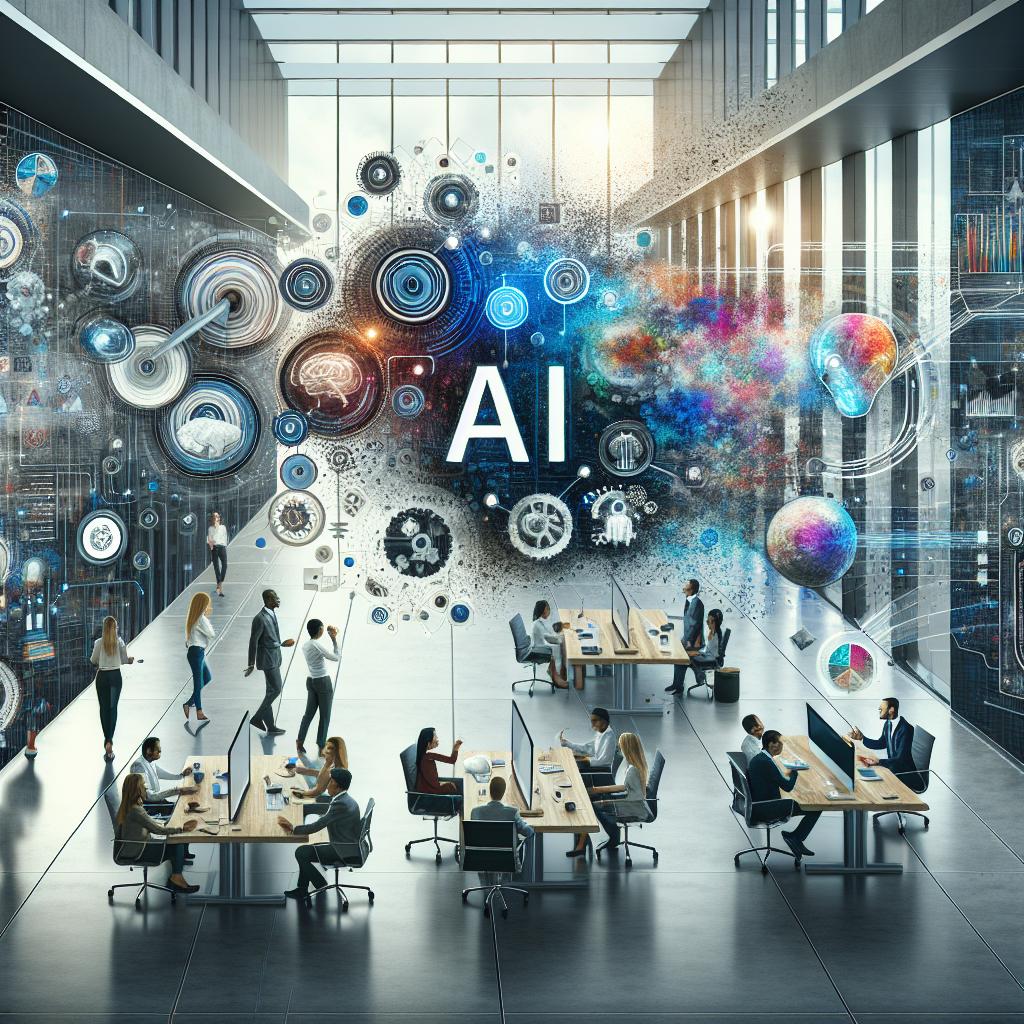TL;DR:
- AI Problems to Solve: Startups face challenges in natural language processing (NLP) and image recognition, crucial for creating helpful bots and ensuring precision in visual-focused AI.
- Machine Learning Solutions: Machine learning algorithms and user feedback are essential for addressing NLP and image recognition challenges in AI development.
- Data Quality Challenges: Startups encounter hurdles in collecting high-quality and diverse datasets, necessitating partnerships and enhanced data analysis software.
- Ethical Considerations: Ethical frameworks and risk assessments are vital for building trust and mitigating potential biases in AI systems.
- Societal Applications of AI: AI revolutionizes healthcare management, environmental sustainability, and societal benefits through predictive diagnostics, resource management, and renewable energy optimization.
Ever felt like AI is a puzzle with pieces that don't quite fit? You're not alone. Tackling AI problems to solve can feel like navigating a maze blindfolded, but fear not—help is at hand! This post peels back the layers of artificial intelligence problem-solving, from the perplexing quirks of natural language processing to the head-scratchers in image recognition. Whether you're an entrepreneur eager to innovate or a marketer aiming for that digital edge, we've got insights galore on analyzing data, automating tasks, and ensuring your AI strategy is ethical and effective. Stick around; it's time to turn those AI woes into wins!
Identifying Common AI Problems to Solve for Startups
Hey there, friend! If you're knee-deep in the startup world and looking to leverage artificial intelligence (AI), you've likely run into a few head-scratchers. You're not alone! AI is like that cool, mysterious character in movies everyone wants to understand but finds a bit intimidating. It's powerful, sure, but it comes with its own set of challenges.
Navigating the World of Artificial Intelligence Problem Solving
So, you want your startup to ride the AI wave—fantastic choice! But where do you start? Before we dive into the nitty-gritty of natural language processing and image recognition woes (trust me, we'll get there), let's chat about why understanding these AI problems is crucial for your entrepreneurial journey.
AI can be a game-changer for startups by offering insights into customer behavior, automating mundane tasks, and even predicting future trends. However, as Spider-Man's Uncle Ben said (kinda), "With great power comes great responsibility." The responsibility here is to tackle those pesky AI problems head-on.
Tackling Natural Language Processing Challenges
First up on our problem-solving tour: natural language processing (NLP). Ever tried chatting with a bot only to have it completely misunderstand what you're saying? Yeah, that's an NLP hiccup. It's all about teaching machines to understand us humans—our slang, sarcasm, and all the weird ways we say things.
Imagine your startup has created this brilliant chatbot that helps users pick out gifts. If someone types "I need a gift that's the bomb!" and your bot suggests an actual explosive—Houston, we have an NLP problem. Solving this involves diving deep into linguistics and context understanding. It's no small feat but getting it right could make your chatbot the go-to gift guru!
Decoding Image Recognition Difficulties
Moving on from words to pictures—we're now at image recognition difficulties station. This one hits close to home if your startup deals with anything visual like security systems or healthcare diagnostics.
The challenge lies in making sure your AI can tell a cat from a capybara or spot anomalies in X-rays accurately. Precision is key because mistakes can range from hilarious misidentifications on social media filters to critical errors in medical assessments.
"A picture is worth a thousand words—but only if your AI can understand what it's looking at."
By addressing these image recognition hurdles early on with heaps of data and relentless testing (and maybe crossing fingers for good luck), you're setting up your visual-focused AI for success.
Seeking Solutions Amidst Challenges in AI
Now let's talk solutions because that’s why we’re here after all—to solve ai problems! For both NLP and image recognition challenges, machine learning algorithms are our knights in shining armor. By feeding them loads of quality data (think: diverse language samples or varied images), they learn better over time—like kids growing up but without the teenage angst.
Don't forget about user feedback either—it’s pure gold! Directly engaging with users through platforms designed for evaluating business ideas can offer invaluable insights into where your AI might be tripping up.
And hey, remember that behind every successful AI-powered feature lies an army of tests—rigorous ones that ensure when someone says “putting on my thinking cap,” the system doesn’t envision them literally wearing their brain as a hat!
Integrating Machine Learning Problem Statements into Your Strategy
Let’s switch gears slightly and ponder over machine learning problem statements—the bread and butter of any self-respecting AI venture. To create impactful machine learning models means first defining clear problem statements: What exactly do you want your model to predict or classify?
For instance, if you're developing an app that predicts stock market trends using AI (talk about ambitious), clearly define what success looks like—is it accuracy within a certain percentage? Is it beating human analysts’ predictions? Hammering out these details is pivotal before training begins so that everyone—from developers to stakeholders—is on the same page.
Take Away
- Natural language processing requires teaching machines context understanding—a significant hurdle but essential for creating helpful bots.
- Image recognition demands precision; mistakes may be funny or serious depending on use-cases.
- Clear machine learning problem statements guide development efforts toward tangible outcomes benefiting startups' strategic goals.
Solving Complex Business Problems with AI
Artificial intelligence (AI) isn't just a buzzword—it's a powerful tool that's transforming how startups solve complex business problems. When you're knee-deep in the startup world, every resource counts, and AI is like having a Swiss Army knife in your digital toolkit. From crunching numbers to automating mundane tasks, AI is the silent partner that helps entrepreneurs stay ahead of the curve.
AI Solutions: The Game-Changer for Startups
Imagine having the ability to analyze massive datasets without breaking a sweat—that's exactly what AI solutions bring to the table. By leveraging algorithms and machine learning, startups can uncover insights that were once buried under mountains of data. It's not just about making sense of information; it's about discovering trends and patterns that can steer your business toward success.
For instance, consider an e-commerce startup grappling with customer retention. With AI, they can sift through purchase histories and browsing behaviors to predict future buying trends and personalize marketing efforts. This level of analysis could be a game-changer for customer engagement strategies.
"The power of AI lies in its ability to process vast amounts of data more quickly than any human ever could."
Analyzing Large Datasets for Insights
Data is the new oil, they say, but raw data alone won't fuel your business engine—you need refinement. That's where AI steps in to analyze large datasets for actionable insights. With tools like enhanced data analysis software, startups can transform data into strategic knowledge.
Let’s take predictive analytics as an example. By feeding historical sales data into an AI system, a startup can forecast future sales peaks and troughs with remarkable accuracy. This foresight enables better inventory management and budget allocation—critical elements for maintaining cash flow in the early stages of a business.
Automating Repetitive Tasks for Efficiency
Another area where AI shines is in automating repetitive tasks. Automation isn’t just about saving time; it’s about reallocating human creativity to areas where it matters most—innovation and problem-solving. For example, chatbots powered by AI can handle customer inquiries without human intervention, freeing up staff to focus on more complex issues.
In marketing efforts, tools like AI-driven content generators can create basic content drafts or suggest social media updates based on trending topics and keywords. These applications don’t replace human creativity but serve as assistants that enhance productivity and efficiency.
Problems for AI Development: Navigating Challenges
Despite its potential, integrating AI into a startup isn't without challenges—the journey from concept to implementation involves several hurdles:
- Data Quality: The old adage "garbage in, garbage out" holds true here; if your input data is flawed or biased, so will be your results.
- Cost: Developing bespoke AI solutions might strain limited budgets.
- Talent: Finding individuals skilled enough to develop and maintain sophisticated AI systems remains difficult.
However daunting these problems may seem, they're not insurmountable—and many startups are finding ways around them through collaboration or utilizing pre-built AI platforms.
Take Away
- Artificial Intelligence provides startups with unparalleled capabilities for analyzing data and automating tasks.
- Leveraging existing platforms can help overcome some common challenges associated with developing custom AI solutions.
- By embracing the power of AI now, startups position themselves at the forefront of innovation within their respective industries.
[Please note: The XML file provided contains URLs intended solely for internal linking purposes within this article.]
Challenges in AI Problem Solving
Artificial Intelligence (AI) has become a cornerstone of innovation, especially for startups looking to disrupt the market with fresh ideas. However, the road to AI integration is fraught with hurdles. Startups aiming to tackle ai problems to solve must navigate through a maze of challenges in ai, ranging from technical hiccups to ethical quandaries.
Data Quality and Quantity Challenges
Let's chat about data—the lifeblood of any AI system. The thing is, AI is only as good as the data you feed it. Startups often hit a snag when they realize that collecting vast amounts of high-quality data isn't a walk in the park. It's like trying to bake a five-star cake with two-star ingredients; it just doesn't work.
Data issues can range from incomplete datasets to biased information that skews your AI's learning process. Imagine training your AI on images of cats, but all your pictures are of orange tabbies. Don't be surprised when it starts identifying every four-legged furball as Garfield!
"In the world of AI, garbage in equals garbage out."
So, what can startups do? First off, ensuring that your data collection methods are top-notch is crucial. This might involve using enhanced data analysis software that can sift through noise and pinpoint valuable insights.
Secondly, diversity in data is key. If you're developing an image recognition tool, make sure you're not just feeding it cat pictures but also dogs, birds, and maybe even a few unicorns—just kidding on the last one! The broader the spectrum of data your AI encounters, the smarter and more versatile it becomes.
Lastly, consider partnering up or utilizing open-source datasets to bolster your database. Sometimes sharing really is caring when it comes to making strides in AI problem-solving.
Ethical Considerations in AI Development
Now let's touch on something a bit more serious: ethics. As we integrate AI into our daily lives and business operations, ethical considerations have moved from being an afterthought to center stage.
Creating an ethical framework for your startup's AI endeavors isn't just about avoiding Skynet scenarios; it’s about building trust with users and stakeholders alike. You've got questions like: How transparent should we be about our algorithms? Are we inadvertently creating biases? How do we protect user privacy?
The answers aren't always clear-cut but laying down some ground rules early on can save you from future headaches—and possibly lawsuits! For instance, ensuring transparency by explaining how your AI game idea generator works could build confidence among users who might otherwise fear their creative inputs are disappearing into a black box.
Moreover, conducting thorough risk assessments can help mitigate potential ethical dilemmas before they arise—kinda like checking if there's water in the pool before diving headfirst! Tools such as business safety risk analysis are invaluable for this purpose.
Remember that while technology may not possess morality, its creators certainly do—or at least should! So as you go about solving those tricky ai problems, keep ethics front and center because nobody wants their brilliant startup associated with rogue robots or privacy nightmares.
Take Away
- High-quality and diverse datasets are essential for effective AI problem-solving; consider partnerships for better data access.
- Ethical considerations are paramount; establish transparency and conduct risk analyses early on.
- Leverage tools like enhanced analysis software and idea generators while remaining vigilant about potential biases within systems.
Potential Applications of AI in Addressing Societal Issues
Artificial intelligence (AI) is not just about futuristic robots and complex algorithms; it's about finding ai problems to solve that can make a real difference in our world. In this blog, we're diving deep into how AI can be harnessed to tackle some of the most pressing issues faced by society today.
AI in Healthcare Management
The healthcare sector is ripe for AI-driven transformation. From personalized medicine to epidemic tracking, AI has the potential to enhance patient care while reducing costs. One profound application is in diagnostics – where AI algorithms can analyze medical images with superhuman precision, spotting issues that might elude even seasoned professionals.
Imagine a system that can predict health problems before they become serious. By analyzing data from wearables and other health monitors, AI could alert individuals and their doctors about potential health risks early on, leading to preventive measures rather than reactive treatments.
For those managing chronic conditions like diabetes or heart disease, AI solutions offer a beacon of hope for better quality of life. These intelligent systems can provide reminders for medication, suggest dietary changes based on real-time blood glucose levels, and even assist with mental health by offering support through chatbots trained in cognitive behavioral therapy techniques.
"With its unparalleled ability to analyze large volumes of data quickly and accurately, AI stands as a formidable ally in the fight against diseases."
Yet another area where AI shines is administrative tasks within healthcare facilities. By automating routine paperwork, scheduling appointments, and managing patient records securely with blockchain technology, healthcare professionals are free to focus on what they do best: caring for patients.
AI for Environmental Sustainability
As we grapple with climate change and environmental degradation, problems for ai development have never been more urgent. Thankfully, AI offers powerful tools for environmental sustainability.
AI's predictive analytics capabilities are being used to forecast weather patterns more accurately than ever before – an essential tool in preparing for natural disasters like hurricanes or floods. But it doesn't stop there; machine learning models help scientists understand climate change impacts at a granular level by simulating countless scenarios based on different variables such as CO2 emissions or deforestation rates.
In agriculture, smart farming techniques employing drones equipped with sensors and machine learning algorithms optimize water usage and crop yields while minimizing harmful pesticides' impact on ecosystems. Moreover, conservation efforts are getting a boost from AI which helps track wildlife populations and detect poaching activities through pattern recognition in satellite images.
Urban planning also benefits from ai applications, which contribute to creating greener cities. Through analyzing traffic flow data, urban centers can reduce congestion and pollution by optimizing public transport routes or designing bike-friendly streetscapes.
The energy sector isn't left behind either. Intelligent grids powered by AI balance energy supply with demand more efficiently than traditional systems ever could—facilitating the integration of renewable energy sources like solar or wind power into our daily lives without compromising reliability or affordability.
Tackling Pollution with Machine Learning
Air quality monitoring takes a giant leap forward when combined with machine learning models capable of predicting pollution levels days in advance. This foresight enables cities to take preemptive action such as restricting vehicle use when high pollution levels are anticipated – safeguarding public health effectively.
Waste management sees innovation too; sorting recyclables becomes faster and more accurate when assisted by robotic arms guided by computer vision systems trained to recognize different materials instantly—a key step towards achieving zero waste goals across the globe.
Preserving Biodiversity Through Data Analysis
Preservation efforts receive much-needed support from data analysis software that tracks animal migration patterns or plant growth across vast regions—identifying critical areas needing protection against human encroachment or climate change effects.
Renewable Energy Optimization
AI doesn't just play defense against environmental challenges; it goes on offense too by helping design ultra-efficient wind turbine blades through generative design software—an approach that iterates thousands of designs quickly until arriving at one optimized for maximum energy output given specific local conditions.
Take Away
- Leveraging AI solutions has immense potential in revolutionizing healthcare management through predictive diagnostics.
- Environmental sustainability is bolstered by utilizing predictive analytics for smarter resource management.
- From improving air quality monitoring to optimizing renewable energy designs – ai problems to solve extend beyond traditional boundaries into societal benefits.
Effective Approaches to Solving AI Problems
When it comes to integrating artificial intelligence (AI) into a startup, there's no shortage of challenges and ai problems to solve. But the truth is, these challenges often present the most exciting opportunities for innovation and growth. Whether you're knee-deep in AI technology issues or just starting to explore ai problem-solving techniques, this article is your friendly guide through the maze.
Defining Clear Objectives for AI Projects
Imagine you're setting off on a road trip without a map. You might have a blast exploring the unknown, but chances are you'll end up circling back without reaching your desired destination. That's pretty much what happens when startups dive into AI projects without clear objectives.
First things first, let's get those goals straight. What exactly do you want your AI to achieve? Are we talking about enhancing data with analysis software, automating mundane tasks, or revolutionizing customer service? Whatever it is, nail it down.
"A goal properly set is halfway reached."
This quote may not mention who said it, but its wisdom resonates deeply in the world of AI startups. Once you've got those objectives defined, you can start mapping out how to get there.
Fostering a Culture of Innovation within Organizations
Creating an innovative culture isn't just about having bean bags and free snacks in the office; it's about encouraging each team member to think outside the box and be open to failure as part of the learning process.
One way startups can foster innovation is by validating their business ideas through feedback loops (Evaluating Business Idea Feedback). This means being willing to listen and adapt based on user experiences and suggestions. It also involves looking at what competitors are doing right—and wrong—with their own AI project ideas.
Another aspect of fostering innovation is ensuring everyone has access to resources that help them stay ahead of the curve. Whether that's time set aside for creative brainstorming or subscriptions to platforms offering the next big thing in startup idea AI, make sure your team has what they need.
Overcoming Challenges in AI
Here’s where things get real: tackling challenges in AI isn’t for the faint-hearted. But who wants an easy game anyway? The thrill lies in figuring out complex puzzles like data privacy concerns, algorithm biases, or simply making sense of massive data sets.
To overcome these obstacles:
-
Stay Educated: Keep up with industry trends by devouring articles on platforms such as Exploring 2024’s Innovative Business Ideas with Explanation that keep you informed about emerging technologies.
-
Collaborate Wisely: Team up with others who complement your skillset—think data scientists collaborating with ethical hackers or UI designers working alongside behavioral psychologists.
-
Test Rigorously: Just like any good chef tastes their cooking throughout preparation, continually test your AI systems (Validate Your AI Business Idea) at every stage of development for quality assurance.
Leveraging AI Problem-Solving Techniques
AI problem-solving techniques aren't one-size-fits-all; they're as diverse as the problems themselves! Sometimes it's about using machine learning algorithms efficiently; other times it’s about applying natural language processing (NLP) effectively.
For example, if you’re developing an app that generates fresh movie concepts using AI (Generate Fresh AI Movie Concepts), experimenting with different NLP techniques could be key to ensuring your app understands and replicates human creativity convincingly.
Understanding Key Technology Issues
It’s crucial not only to understand but also anticipate potential technology issues before they arise. For instance:
-
Scalability: Can your system handle growth? It’s essential when considering long-term success.
-
Integration: How well does your solution play with existing systems? Seamless integration can make or break user experience.
-
Security: Are there vulnerabilities within your system? Regularly updating security measures ensures business safety (Ensure Business Safety: Risk Analysis and Mitigation) from cyber threats.
The Role of MVP Strategies
Building a Minimal Viable Product (MVP) allows startups to test their hypotheses without burning through cash faster than a rocket at lift-off (Boosting Your Startup with MVP Strategies: Developing a Minimal Viable Product). An MVP focuses on core functionalities necessary for solving primary user pain points—nothing more, nothing less.
So before trying to build an all-singing-all-dancing product loaded with features nobody asked for (yet), focus on creating something small yet powerful enough to deliver value and gather critical user feedback early on.
Embracing Risk Analysis
Risk analysis isn't just a buzzword—it's an essential part of any startup journey (Revolutionizes Tech With Ai Startup Idea Generator 2024). It involves identifying potential risks before they become real problems and coming up with strategies for mitigation.
Whether it's analyzing market trends or performing technical feasibility studies, understanding risks helps navigate through stormy waters confidently towards success shores.
Take Away
- Define clear objectives for your AI projects – know where you’re headed before stepping on the gas.
- Cultivate an environment where mistakes are seen as steps toward innovation – this encourages risk-taking.
- Leverage MVP strategies – build just enough product features needed for initial validation while conserving resources.
Conclusion
Frequently Asked Questions
What are some common AI problems to solve?
Some common AI problems to solve include natural language processing, image recognition, predictive analytics, and autonomous decision-making.
How can AI help in solving complex business problems?
AI can help in solving complex business problems by analyzing large datasets, identifying patterns and trends, automating repetitive tasks, and providing insights for better decision-making.
What are the challenges in solving AI problems?
Challenges in solving AI problems include data quality and quantity, algorithm selection, model interpretability, ethical considerations, and integration with existing systems.
What are the potential applications of AI in addressing societal issues?
AI can be applied to address societal issues such as healthcare management, environmental sustainability, public safety, education accessibility, and resource optimization.
How can organizations approach solving AI problems effectively?
Organizations can approach solving AI problems effectively by defining clear objectives, investing in data infrastructure, fostering a culture of innovation, collaborating with domain experts, and continuously evaluating and improving AI solutions.





Leave a Reply